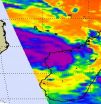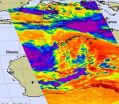(Press-News.org) VIDEO:
Nobody enjoys colonoscopies, including mice. University of Missouri researchers are excited about the potential of using genetic biomarkers to predict colon cancer caused by inflammation. A new method developed at...
Click here for more information.
COLUMBIA, Mo. – Nobody enjoys colonoscopies, including mice. University of Missouri researchers are excited about the potential of using genetic biomarkers to predict colon cancer caused by inflammation. A new method developed at the MU Research Animal Diagnostic Laboratory (RADIL) could eventually lead to a method that might eliminate colonoscopies altogether.
While working to develop novel therapeutics for colon cancer, Craig Franklin, associate professor of veterinary pathobiology in the MU College of Veterinary Medicine; Aaron Ericsson, post-doctoral researcher at MU; Mike Lewis, assistant professor of veterinary medicine and surgery; Matt Myles, assistant professor of veterinary pathobiology and Lillian Maggio-Price, professor of comparative medicine at the University of Washington, found biomarkers in mouse feces that predicted inflammation-associated colon cancer. This is the same type of cancer associated with some common inflammatory bowel diseases such as ulcerative colitis and Crohn's Disease.
The team found that the bacterium that leads to inflammation-associated colon cancer in mice first results in inflammation that can be detected by screening feces for messenger RNA of genes. Franklin believes this discovery could lead to tests for similar genes that are present in humans with early inflammation associated colon cancer.
The study was published recently in Neoplasia, which also featured the study on the journal's cover.
"The assumption was that the gene expression couldn't be detected in fecal matter because RNA breaks down very rapidly. Historically, this was something that a lot of scientists, including us, hadn't considered," Franklin said. "But technology has evolved, and we now have the means of preserving RNA much better than we did 15 years ago."
As a laboratory animal veterinarian, Franklin believes this discovery also could decrease the number of animals used in research.
"We're excited about the potential for application in humans, but this also will decrease animal numbers, which is one of our goals," Franklin said. "This test determines which mice will get cancer in advance, so we won't need to have as many animals in an experimental group to achieve statistical significance."
"There's also no stress on the animal for us to test their fecal matter," Ericsson said. "Many people put off colonoscopies longer than they should because of the invasiveness and unpleasant nature of the exam, and it's not pleasant for mice either. That unpleasantness is negated with this test."
For this study, the team also used a high-powered MRI machine located in the Department of Veterans Affairs facility located at the Harry S. Truman Memorial Veterans' Hospital. While effective, this technique was not as sensitive as the fecal biomarkers in predicting cancer, and it requires extensive expertise and very expensive equipment. Franklin credits the success of the project to a multidisciplinary team that included Wade Davis, assistant professor of biostatistics; Lixin Ma, assistant professor of radiology, and a multitude of veterinarians.
"It was a large collaboration, and veterinarians are ideal for collaborative medicine because we know the animal model," Franklin said. "There are several angles that converge here, and we're now interested in finding collaborators in human medicine that would like to explore this further. Ultimately, I'd envision panels of tests that predict diseases, with this method in the mix."
### END
MU researchers believe discovery could lead to testing that displaces colonoscopies
Predicting colon cancer in mice could eventually benefit humans
2011-02-17
ELSE PRESS RELEASES FROM THIS DATE:
Most New Jersey residents see global health as critical to state's economy
2011-02-17
WASHINGTON—February 16, 2011—Despite the unpredictable economy, nearly three-quarters (73%) of New Jersey residents think spending money on research to improve health globally is important to jobs and incomes in the state, according to a new statewide poll commissioned by Research!America. The poll data will be released today at a meeting in Washington, DC, of prominent global health research and development (R&D) experts and New Jersey business, academia and nonprofit leaders. This is part of a six-state effort by Research!America.
According to the poll, most of the ...
California Health Interview Survey releases newest data on state residents' health
2011-02-17
The California Health Interview Survey (CHIS), the nation's largest state health survey and a primary source of information on California's diverse population, released its latest data today on more than 100 topics affecting the health and well-being of the state's residents.
The random–digit-dial telephone survey, conducted every two years by the UCLA Center for Health Policy Research, gathers essential information from tens of thousands of California households on a wide variety of topics, from health insurance and public program participation to diabetes, obesity ...
NASA satellite sees Tropical Storm Bingiza hugging the western Madagascar coastline
2011-02-17
Infrared satellite data from NASA is showing some strong thunderstorms over west-central Madagascar today as Tropical Storm Bingiza continues to hug the western coast of the island nation.
The Atmospheric Infrared Sounder (AIRS) instrument that flies aboard NASA's Aqua satellite captured an infrared image of Tropical Storm Bingiza today, Feb. 16 at 10:17 UTC (5:17 a.m. EST). The image revealed some strong convection over the west-central coast where thunderstorm cloudtops were high and dropping moderate to heavy rainfall. Infrared data can provide temperature information ...
NASA sees tropical cyclone double-trouble for Australia
2011-02-17
NASA's Aqua satellite captured an infrared image today of tropical cyclones affecting Australia in the western and northern areas of the country. Newly formed Tropical Storm Carlos is bringing heavy rains and gusty winds to Darwin and the Northern Territory, while Tropical Storm Dianne is bringing rains and winds to Western Australia.
NASA's Aqua satellite passed over Australia today, Feb. 16 at 05:17 UTC (12:17 a.m. EST/ 2:47 p.m. Australia/Darwin local time. The Atmospheric Infrared Sounder (AIRS) instrument captured an infrared image of both tropical storms and found ...
Herschel finds less dark matter but more stars
2011-02-17
ESA's Herschel space observatory has discovered a population of dust-enshrouded galaxies that do not need as much dark matter as previously thought to collect gas and burst into star formation.
The galaxies are far away and each boasts some 300 billion times the mass of the Sun. The size challenges current theory that predicts a galaxy has to be more than ten times larger, 5000 billion solar masses, to be able form large numbers of stars.
The new result is published today in a paper by Alexandre Amblard, University of California, Irvine, and colleagues.
Most of the ...
Trial suggests statin may affect markers associated with progression of HIV
2011-02-17
A recent multicenter clinical trial of atorvastatin, a type of cholesterol-lowering drug, found that although the drug did not inhibit plasma HIV RNA levels, it did inhibit expression of cellular markers of immune activation and inflammation in patients with HIV infection. Since immune activation and inflammation are associated with progression of HIV infection, the implication is that the statin may inhibit disease progression and help in the infection's management. The findings are in a study, available online, published in The Journal of Infectious Diseases.
The investigators, ...
New test shows promise for accurate diagnosis of Turner syndrome
2011-02-17
As a child grows, a short stature is not usually cause for concern, but it is often the only sign of a condition called Turner syndrome. Prevalent in girls, Turner syndrome is a genetic defect that short-circuits normal growth and leads to cardiac and renal problems. It is not commonly detected until age 10 or older when a youngster's unusually short height raises suspicions.
This lag before diagnosis of the condition can delay the start of growth hormone therapy, which can help in achieving normal or near-normal adult stature. Yale School of Medicine researchers are ...
Drug therapy shows significant benefit in treating a leading cause of childhood blindness
2011-02-17
A readily available, inexpensive drug therapy showed a significant benefit in treating premature infants with the worst and historically most difficult-to-treat cases of retinopathy of prematurity.
The results of a multicenter clinical trial led by researchers at The University of Texas Health Science Center at Houston (UTHealth) are published in the Feb. 17 issue of The New England Journal of Medicine.
Retinopathy of prematurity is a leading cause of childhood blindness worldwide. In the immature retina of babies born before 30 weeks' gestational age, the disease results ...
Research improves diagnosis and treatment of bleeding disorder
2011-02-17
A rare bleeding disorder that can lead to life-threatening bleeding episodes is misdiagnosed in 15 per cent of cases according to findings from a new international research project led by a Queen's professor.
"Correct diagnosis is critical because it determines the treatment decision," says Maha Othman, a professor in the Department of Anatomy and Cell Biology who led the three-year research project on the rare platelet type of von Willebrand disease (VWD).
Patients with VWD are commonly treated with drugs that help control their condition. However, these drugs aggravate ...
Global warming may reroute evolution
2011-02-17
ANN ARBOR, Mich.---Rising carbon dioxide levels associated with global warming may affect interactions between plants and the insects that eat them, altering the course of plant evolution, research at the University of Michigan suggests.
The research focused on the effects of elevated carbon dioxide on common milkweed, Asclepias syriaca. Milkweed is one of many plants that produce toxic or bitter chemical compounds to protect themselves from being eaten by insects. These chemical defenses are the result of a long history of interactions between the plants and insects ...
LAST 30 PRESS RELEASES:
Cal Poly’s fifth Climate Solutions Now conference to take place Feb. 23-27
Mask-wearing during COVID-19 linked to reduced air pollution–triggered heart attack risk in Japan
Achieving cross-coupling reactions of fatty amide reduction radicals via iridium-photorelay catalysis and other strategies
Shorter may be sweeter: Study finds 15-second health ads can curb junk food cravings
Family relationships identified in Stone Age graves on Gotland
Effectiveness of exercise to ease osteoarthritis symptoms likely minimal and transient
Cost of copper must rise double to meet basic copper needs
A gel for wounds that won’t heal
Iron, carbon, and the art of toxic cleanup
Organic soil amendments work together to help sandy soils hold water longer, study finds
Hidden carbon in mangrove soils may play a larger role in climate regulation than previously thought
Weight-loss wonder pills prompt scrutiny of key ingredient
Nonprofit leader Diane Dodge to receive 2026 Penn Nursing Renfield Foundation Award for Global Women’s Health
Maternal smoking during pregnancy may be linked to higher blood pressure in children, NIH study finds
New Lund model aims to shorten the path to life-saving cell and gene therapies
Researchers create ultra-stretchable, liquid-repellent materials via laser ablation
Combining AI with OCT shows potential for detecting lipid-rich plaques in coronary arteries
SeaCast revolutionizes Mediterranean Sea forecasting with AI-powered speed and accuracy
JMIR Publications’ JMIR Bioinformatics and Biotechnology invites submissions on Bridging Data, AI, and Innovation to Transform Health
Honey bees navigate more precisely than previously thought
Air pollution may directly contribute to Alzheimer’s disease
Study finds early imaging after pediatric UTIs may do more harm than good
UC San Diego Health joins national research for maternal-fetal care
New biomarker predicts chemotherapy response in triple-negative breast cancer
Treatment algorithms featured in Brain Trauma Foundation’s update of guidelines for care of patients with penetrating traumatic brain injury
Over 40% of musicians experience tinnitus; hearing loss and hyperacusis also significantly elevated
Artificial intelligence predicts colorectal cancer risk in ulcerative colitis patients
Mayo Clinic installs first magnetic nanoparticle hyperthermia system for cancer research in the US
Calibr-Skaggs and Kainomyx launch collaboration to pioneer novel malaria treatments
JAX-NYSCF Collaborative and GSK announce collaboration to advance translational models for neurodegenerative disease research
[Press-News.org] MU researchers believe discovery could lead to testing that displaces colonoscopiesPredicting colon cancer in mice could eventually benefit humans




